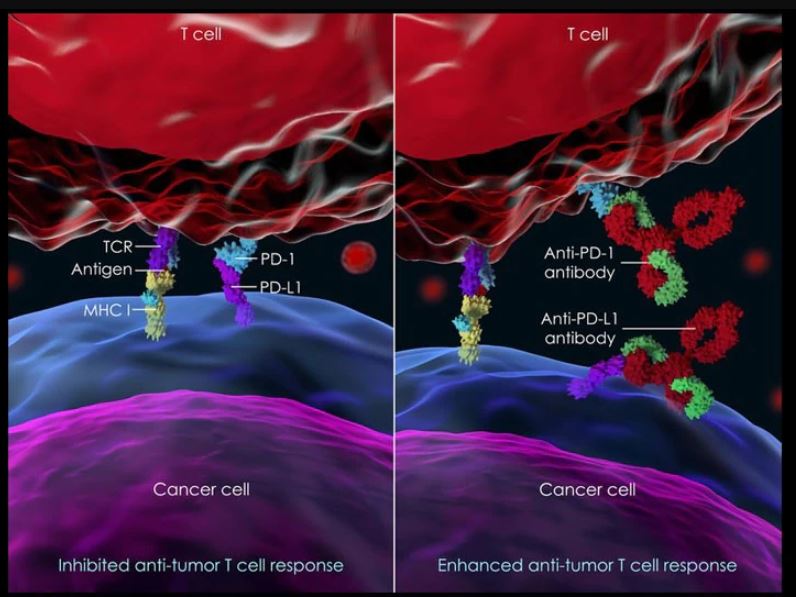When the immune system is functioning efficiently, cancer cells are often quickly found to be destroyed by immune cells. But cancer patients’ immune systems are often dysfunctional, allowing cancer cells to take advantage of the body’s mischief.
A recent study by scientists at the Mayo Clinic in the United States found that using RNA technology to increase the expression of key genes in immune cells can effectively restore the ability of immune cells to kill cancer cells. The findings were published in the February issue of Cancer Immunology Research.

Cancer Immunotherapy Still Not Perfect
Immune check point inhibitor is an anticancer drug for cancer immunotherapy. It can activate the immune system of cancer patients to help fight cancer. It is the last hope for many terminal cancer patients.
Some patients’ cancer cells disappear completely after treatment, but most terminal cancer patients still can’t overcome the disease after receiving treatment.
Scientists from the Miaoyou Medical Institution in the United States have tried every means to find out what went wrong in the immune cells of ineffective patients. Only by finding the cause can they be corrected and more patients with terminal cancer can be saved.
Starting with immune cells to find the cause
Cytotoxic T cells are important part of the human immune system against cancer cells.
When a cancer cell is identified, the perforin protein (perforin), which can pass through the cancer cell, and the granzyme, which hydrolyzes the cancer cell’s proteolysis, are released, causing the cancer cell to die.
As cancer progresses, many cancer cells develop the ability to suppress T cells from attacking, escaping immune system control.
Immune checkpoint inhibitors are drugs that can block cancer cells from inhibiting T cell attack. After many clinical patients receive treatment, the immune system returns to normal function and the cancer cells almost completely disappear.
But many more patients did not get better when they were treated with immune checkpoint inhibitors.
Scientists from Mayoclinic Medical Institution are thinking about whether the patient’s T cells themselves are diseased? If you can figure out what’s wrong with your T cells, you have the opportunity to prescribe the right remedy.
The NKG7 gene is the key
The researchers sampled cytotoxic T cells from patients who responded to and did not respond to immune checkpoint inhibitor therapy, and used single-cell RNA-sequencing to analyze the differences in T cell gene expression between the two groups.
After analysis, it was found that the expression level of a gene called NKG7 is the key to affecting whether the condition of cancer patients improves after receiving immune checkpoint inhibitor therapy.
Further experiments showed that the NKG7 gene protein product is required for the process of T cells secreting toxin-killing cancer cell proteins. When the expression of NKG7 gene is low, the ability of T cells to secrete toxin-killing proteins will decrease, and the ability to poison cancer cells will become worse.
RNA technology regulates cellular gene expression with high safety
Advances in RNA technology in recent years have enabled scientists to synthesize specific gene messenger RNA (mRNA) and send it to immune cells for the expression of the protein encoded by the gene.
Compared with other regulatory gene expression technologies, RNA-based technologies do not damage the integrity of the target cell chromosome, have a lower chance of unexpected gene mutations, and are safer.
Using mRNA technology to increase NKG7 protein content in T cells
Now let’s get to our most important topic. After the researchers delivered NKG7 mRNA to the immune cells of patients not treated with immune checkpoint inhibitors, they successfully increased the amount of NKG7 protein in the cells, and more importantly, the T cells’ ability to kill cancer cells also increased. This means that a certain protein content for cells can be increased using mRNA technology. Thus, the immune system can be stimulated by developing a vaccine against cancer cells.
And after treatment with immune checkpoint inhibitors, the effect of poisoning cancer cells is more powerful. As for healthy T cells that already have the ability to kill, the mRNA delivered to NKG7 can no longer enhance the effect of killing cancer cells.




